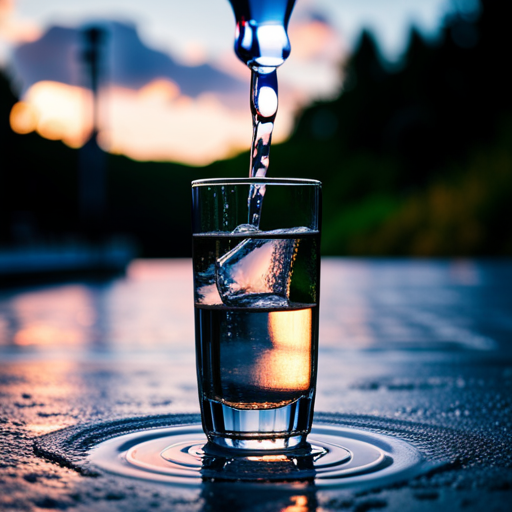If you live in Austin, you may have noticed that your water feels hard or leaves behind mineral deposits. You’re not alone! Hard water is a common issue in the city due to the high mineral content in the water supply.
Unfortunately, hard water can cause damage to your appliances, irritate your skin, and leave your clothes looking dull. But don’t worry, there are solutions to address water hardness and conserve water in Austin.
In this article, we’ll explore the hard water woes in Austin and provide solutions for addressing them while also promoting water conservation. By taking action to address water hardness, you can extend the life of your appliances and reduce your water bill. Plus, by conserving water, you can help protect our precious natural resources and ensure a sustainable future for our city.
So let’s dive in and learn more about how we can tackle hard water and conserve water in Austin!
Key Takeaways
– Austin has moderately hard water with a hardness of 84.5 ppm, caused by minerals like calcium and magnesium, which can lead to issues like scaling and damage.
– Hard water is a common problem in Texas, with levels ranging from <50 mg/L to >500 mg/L, and can cause a variety of issues like mineral deposits, soap scum, and dry skin.
– Austin’s drinking water is drawn from the Colorado River and Highland Lakes, treated for safety, and free of contaminants like lead, copper, and bacteria, but complaints about taste, smell, and appearance are not uncommon.
– Water conservation efforts in Austin include rebates for water-efficient appliances, free irrigation system evaluations, and educational resources, with an average daily water consumption of 135 million gallons in 2020.
Water Hardness in Texas
If you live in Texas, you may experience hard water with elevated levels of dissolved minerals that can cause scale on pipes, appliances, and fixtures, as well as leave soap scum and cause dry skin.
The hardness levels in Texas can range from less than 50 mg/L to more than 500 mg/L. This can be a significant issue for homeowners, as mineral deposits can form scale on pipes, appliances, and fixtures, leading to damage and expensive repairs.
However, there are solutions to this problem, including water treatment and water filtration. Water treatment options such as water softeners, reverse osmosis systems, and chemical treatments can effectively address hardness.
Water softeners protect appliances, clothes, and skin, while reverse osmosis systems remove minerals from the water by passing it through a semi-permeable membrane. Chemical treatments prevent mineral deposits from forming in the first place.
With the right water treatment solution, you can enjoy the benefits of clean, clear, and safe water without the negative effects of hard water.
Effects of Hard Water
You may notice that your skin feels dry and itchy after showering or that your clothes appear faded and dingy after washing due to the minerals present in the water. Hard water contains elevated levels of dissolved minerals like calcium and magnesium, which can have negative effects on your skin and hair health. These minerals can strip away natural oils, leaving your skin feeling dry and itchy. They can also cause buildup in your hair, making it feel dull and lifeless.
Mineral buildup prevention is essential to addressing the effects of hard water on your skin and hair health. Routine cleaning can help manage hardness levels, but water softeners, reverse osmosis systems, and chemical treatments can effectively address hardness.
Softeners protect appliances, clothes, and skin by removing dissolved minerals from the water. Reverse osmosis may not be practical for large households or high water usage, but it can effectively remove minerals and other impurities from the water. Chemical treatments, such as phosphate or silicate dosing, can prevent mineral deposits from forming, protecting your skin, hair, and appliances.
Addressing Water Hardness
To effectively address the negative effects of mineral buildup on your skin and hair health, consider using water softeners, reverse osmosis systems, or chemical treatments.
Water softening methods work by removing the minerals that cause hardness from the water supply. This helps to prevent scaling, damage, and irritation caused by hard water. Softeners are a cost-effective solution for protecting your appliances, clothes, and skin, especially if you have a large household or high water usage.
Reverse osmosis systems are another option for addressing water hardness. These systems use a membrane to filter out minerals and other contaminants from the water. While effective, they may not be practical for larger households or those with high water usage due to their cost.
Chemical treatments, on the other hand, can prevent mineral deposits and buildup by altering the chemistry of the water. These treatments are often used in commercial settings but can also be used in residential settings for those looking for an alternative to softeners or reverse osmosis systems.
Overall, there are various cost-effective solutions available to address water hardness and improve the quality of your water supply.
Conclusion
Congratulations, you’ve successfully learned about the hard water woes in Austin and discovered effective solutions for addressing water hardness while promoting water conservation.
Living in Austin, you may have already noticed the negative effects of hard water on your appliances, skin, and clothing. However, with the use of water softeners, reverse osmosis systems, and chemical treatments, you can say goodbye to hard water and its harmful effects.
Furthermore, by taking advantage of rebates for water-efficient appliances and free irrigation system evaluations, you can also conserve water and reduce your water bill.
Don’t let hard water continue to cause damage and irritation in your life. Take action today and enjoy the benefits of soft, clean water while also contributing to a more sustainable future for Austin.
